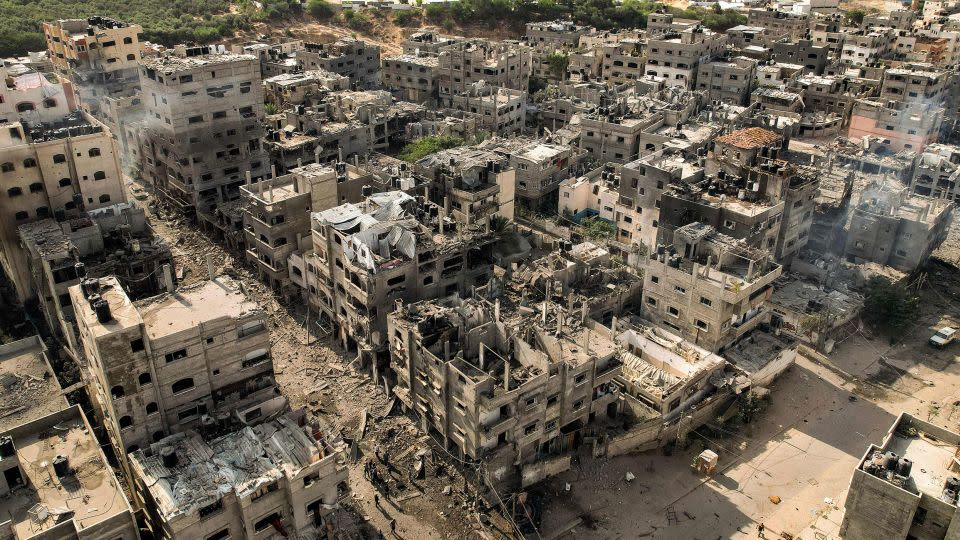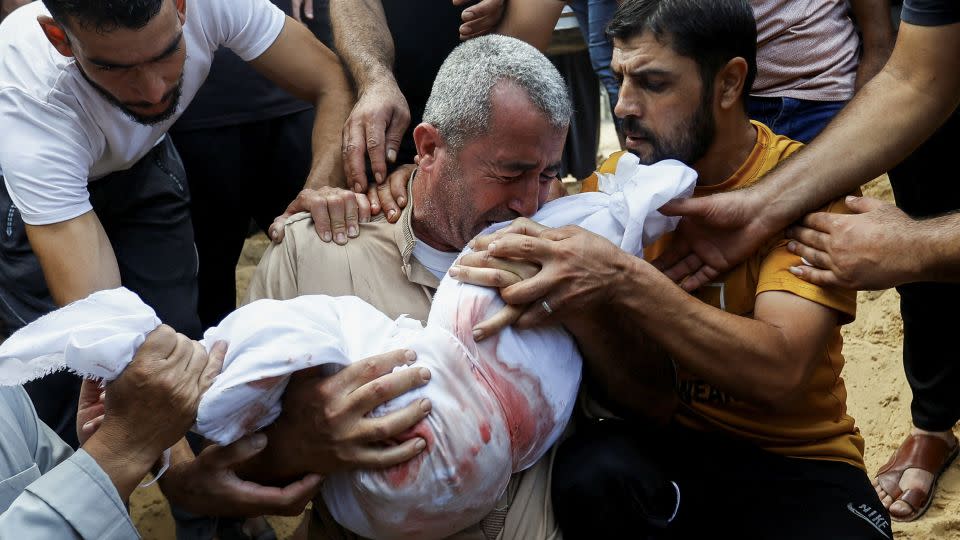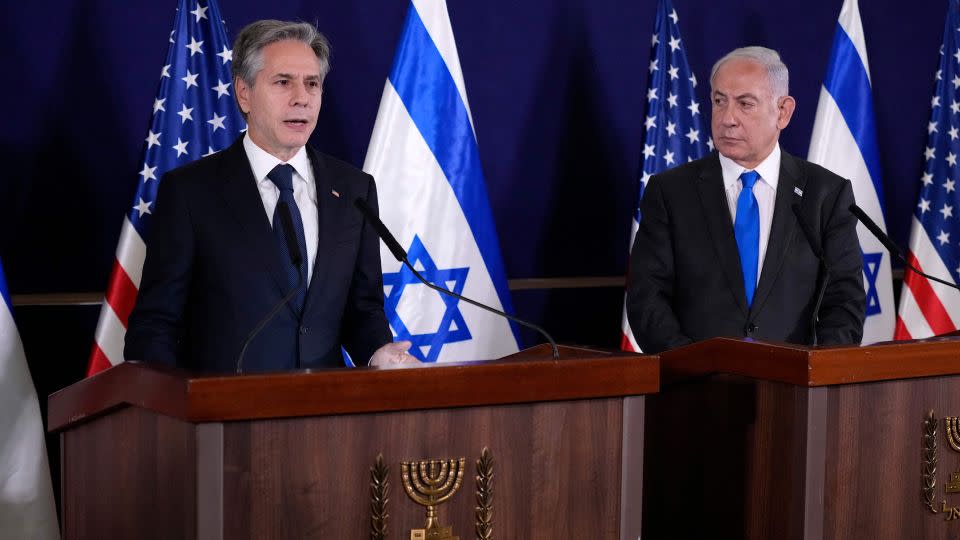Gaza crisis grows under intense bombardment as Israel retaliates against Hamas atrocities
- Oops!Something went wrong.Please try again later.
Gaza’s humanitarian crisis deepened Thursday, with warnings that the population is at risk of starvation and fuel could run out within hours, as Israel continues airstrikes and withholds essential supplies from the enclave in response to Hamas’ brutal terror attacks.
The decades old conflict between Israelis and Palestinians has entered uncharted territory this week as Israeli declared a “complete seige” on Gaza. Bombardment by Israeli war planes have reduced entire streets to rubble and killed over 1,500 people in the isolated and densely-inhabited area, including 500 children, according to the Palestinian Health Ministry.
Israel’s stepped-up offensive in Gaza follows a bloody surprise attack by Hamas on October 7, which saw armed militants pour over the heavily-fortified border into Israel. The group’s gunmen killed more than 1,200 people, wounding thousands more in a coordinated rampage through farms and communities, and taking civilian and military captives. Some 150 hostages are thought to be currently held by Hamas in Gaza.
The atrocities committed by Hamas have sparked international revulsion and vows by Israel’s government to destroy the group, which controls Gaza and has continued to fire rockets at Israeli towns over the last five days.
In a press conference with US Secretary of State Antony Blinken in Tel Aviv on Thursday, Israel’s Prime Minister Benjamin Netanyahu said Hamas should be “crushed” and “spat out from the community of nations.”
Blinken vowed US support for Israel and likened Hamas’ crimes to ISIS. At least 25 Americans have been killed in Israel, he said.
He said he discussed with Israeli officials ways to address humanitarian needs in Gaza “while Israel conducts its legitimate security operations.”

A ‘severe humanitarian crisis’
More than 2 million Palestinians – including over a million children – live in the Gaza Strip, an area that has been under a land, sea and air blockade enforced by Israel since 2007.
Children make up “between 30 and 40% of the wounded” in recent Israeli air strikes on Gaza, British-Palestinian surgeon Ghassan Abu-Sittah told CNN on Thursday.
Speaking to CNN’s Christiane Amanpour from Al Awda Hospital in Gaza, Abu-Sittah said that “the overwhelming majority of the wounded are coming from the rubble of their own home.”
“There are body parts scattered everywhere. There are still people missing,” one man in the northern neighborhood of Al-Karama said. “We’re still looking for our brothers, our children. It’s like we’re stuck living in a nightmare.”
Among the dead are at least 12 United Nations employees, the UN said on Thursday. All of the aid workers who died were Palestinian, UN spokesman Stéphane Dujarric added.
Israel says its strikes are intended to target Hamas-associated locations.
Israel has also ordered a “complete siege” on the enclave, including halting supplies of electricity, food, water and fuel. Israel’s Energy Minister Israel Katz said on Thursday that supplies would remain cut off until hostages being held by Hamas are freed.
“No electrical switch will be turned on, no water hydrant will be opened, and no fuel truck will enter until the Israeli abductees are returned home. Humanitarian for humanitarian. And no one will preach us morals,” Katz said on social media.
The European Union and the United Nations have strongly criticized the tactic, with the UN warning that withholding essential supplies will “precipitate a severe humanitarian crisis in Gaza, where its population is now at inescapable risk of starvation.”
Food and water are “quickly running out,” the deputy head of emergencies of the UN World Food Programme, Brian Lander, said Thursday.
More 338,000 people are have been displaced in Gaza, according to a statement by the United Nations Office for Coordination of Humanitarian Affairs (OCHA) on Thursday. The figure represents a increase of 30% since Wednesday.
Gaza’s only power station stopped working on Wednesday after running out of fuel, the head of the Gaza power authority Galal Ismail told CNN.
Hospitals are expected to run out of fuel on Thursday, leading to “catastrophic” conditions, the Palestinian Health Ministry warned.
A surge in injured people seeking treatment has pushed Gaza’s health infrastructure close to breaking point, according to Ashraf Al-Qudra, a spokesperson for the Ministry of Health in Gaza. “Even after expansion, all beds are occupied, leaving no room for new patients in critical condition,” he said on Thursday.
The International Committee of the Red Cross warned on Thursday that hospitals in the enclave “risk turning into morgues” following Israel’s siege.

Palestinian Minister of Health Mai al-Kaila has called for urgent international assistance to help set up field hospitals in the Gaza Strip and to provide medicines and medical supplies.
“We are extremely worried that what is happening now is totally unprecedented,” Najla Shawa, an Oxfam worker in Gaza, told CNN. “We are talking about entire areas, not just one area. Entire areas are being wiped and destroyed.”
‘Possible escalations’
On Thursday, the IDF said it was continuing “large scale strikes on terror targets belonging to the Hamas terrorist organization in the Gaza strip,” as speculation of a possible ground incursion into Gaza grows.
Some 300,000 reservists have also been moved near the Gaza border, according to the Israel Defense Forces (IDF), a huge mobilization given the country’s 9 million population.
“They are now close to the Gaza Strip, getting ready to execute the mission that they have been given,” Lt. Col. Jonathan Conricus said Wednesday said.
Israel’s government also said it was preparing its hospitals and healthcare system for “possible escalations in the security situation,” its health ministry said.
Hamas’ attack has also sparked some political unity in Israel after months of domestic friction with Netanyahu and National Unity Party leader Benny Gantz jointly announcing an emergency government and war management cabinet on Wednesday.
Gantz, a former defense minister, will join Netanyahu and current defense minister Yoav Gallant in a wartime cabinet.
“There is time for war and time for peace. This, now, is the time for war,” Gantz said during a televised address.

A diplomatic push is being made to try and bring about some sort of mediation.
Defense Secretary Lloyd Austin will travel to Israel on Friday to meet with Israeli Prime Minister Benjamin Netanyahu and Defense Minister Yoav Gallant, according to a senior defense official.
Blinken will also visit Egypt as part of his trip, and will meet with Palestinian Authority President Mahmoud Abbas and King Abdullah II of Jordan on Friday.
Calls for a humanitarian corridor
Talks are currently “underway” to allow US citizens and Palestinian civilians in the Gaza Strip to exit the territory into Egypt ahead of any land invasion of the territory by Israeli forces, a senior Israeli official told CNN on Wednesday.
The official with knowledge of the negotiations said that under the proposal being discussed, all US citizens would be permitted to pass through the Rafah border crossing if they present their US passports, while the movement of other Palestinian civilians would be limited to 2,000 people a day.
A US official said on Wednesday that Cairo wants to use a humanitarian corridor to send food and medical supplies into Gaza, but does not to open the border in the other direction for civilians who are fleeing.
With the current Israeli blockade on Gaza, the only route through which people or aid can pass in and out of the strip is the Rafah Crossing, which links Gaza and Egypt, and has been damaged in Israeli airstrikes.
Horror stories
Horrifying details on the scale and nature of Hamas’ attacks have emerged each day, as well as tales of survival and bravery amidst the carnage. On Thursday, Netanyahu’s office released photos of “babies murdered and burned” by Hamas.
Tom Hand, a resident of the Be’eri, a kibbutz where Hamas gunmen left at least 120 dead, learned his daughter Emily, 8, was among those killed in Saturday’s onslaught.
“I knew she wasn’t alone, she wasn’t in Gaza, she wasn’t in a dark room filled with Christ knows how many people, pushed around… terrified every minute of every day, possibly for years to come. So death was a blessing,” he told CNN, his voice broken, tears streaming down his tired, ashen face.
The fact that Hamas has taken an unprecedented number of hostages now complicates Israel’s response.
On Wednesday, International IDF spokesperson, Lieutenant Colonel Jonathan Conricus, told CNN that Israeli authorities believe the hostages are being held underground.
“Reason dictates that they are underground,” he said. “Reason dictates that they planned in advance locations to hide these hostages and keep them safe from Israeli intelligence, and efforts to get them out.”
He said even though Israel has had “some experience” with hostage situations they have never dealt with anything like this.
Izzat al-Risheq, a senior Hamas official, told CNN on Wednesday that it’s too early to exchange Israeli hostages.
“There were many calls made by Arab and non-Arab states to Hamas leadership abroad asking about the possibility of exchanging Israeli captives with Hamas prisoners,” al-Risheq said from Doha, Qatar.
“But we told everybody that it’s now too early to discuss it while Israel continues to pound Gaza and kill Palestinian civilians indiscriminately.”
CNN’s Ibrahim Dahman, Eyad Kourdi, Sharon Braithwaite, Caitlin Danaher, Jennifer Hansler, Casey Riddle, Kevin Liptak, Matthew Chance, Nadeen Ebrahim, Abeer Salman, Richard Roth, Alex Hardie, Natasha Bertrand and Michael Conte contributed reporting.
For more CNN news and newsletters create an account at CNN.com

